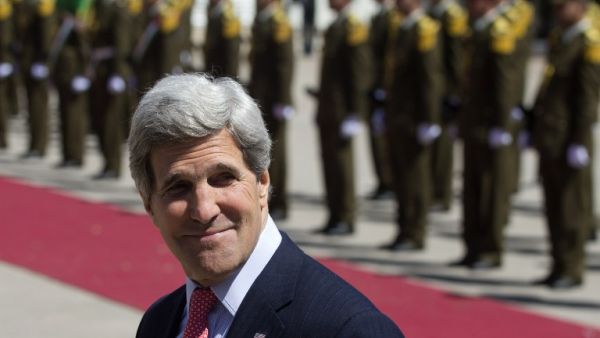U.S. Secretary of State John Kerry said Friday there was “strong evidence” that the regime had used chemical weapons, after Russia and Britain agreed to try to put aside differences and work toward bringing the Syrian sides to talks.
“This fight is about the terrible choices that the Assad regime has made with its willingness to kill anywhere ... to use gas, which we believe there is strong evidence of use of,” Kerry said during an online chat.
British Prime Minister David Cameron said after talks with Russian President Vladimir Putin in the Black Sea resort of Sochi that they had agreed “that as permanent members of the U.N. we must help drive this process.”
He said international efforts envisaged “not just bringing the regime and opposition together at one negotiating table, but Britain, Russia, America and other countries helping shape a transitional government that all Syrians can trust to protect them.”
Russia has been under pressure to cooperate more with Western powers at the United Nations Security Council on ending the bloodshed.
Moscow has supported President Bashar Assad’s government and supplied it with weapons, but agreed with the U.S. this week to help bring the warring sides together for peace talks.
“We have a common interest in the quickest end to the violence and the initiation of a peace process, and the preservation of Syria as a territorially whole sovereign state,” Putin said after the talks.
As plans for peace talks gathered pace, the opposition Syrian National Coalition held a series of meetings to try to overhaul the body and elect a new leadership for the group.
The coalition has been in crisis since the resignation of Ahmad Moaz Khatib over perceived international agendas steering the work of the body and disagreement over the preacher’s initiative to negotiate with the Syrian regime to find a political solution to the crisis.
Christian George Sabra, head of the Syrian National Council bloc dominated by the Muslim Brotherhood, was appointed interim leader of the coalition. However, he has faced accusations that he is a puppet for the Brotherhood and lacks popular support.
Also on the agenda was the replacement of the head of a yet-to-be formed transitional government designed to administer rebel-held areas in the north of the country.
Saudi Arabia and Qatar have reportedly fallen out over repeated accusations that Doha and the Muslim Brotherhood are channeling weapons to radical Islamic groups on the ground.
Adding to Western concerns is the increasing influence of the Al-Qaeda-aligned Nusra Front. Reflecting these fears, U.N. diplomats said Friday the Security Council would add Nusra to its sanctions blacklist next week.
Those fears have in part led to a U.S.-Saudi-backed plan to train and arm vetted moderate rebel groups, under the command of Syrian General Salim Idriss, from Jordan, which also fears a hostile Islamist opposition takeover in Syria.
However concerns about the logistics of control of weapons flow to more favorable opposition groups has hindered the project.
Arab diplomatic sources say the U.S. and Saudi Arabia have become increasingly unhappy with Qatar’s role in arming the opposition.
Saudi Arabia has stepped up its involvement with the political bodies of the coalition and, in meetings with the executive body of the coalition in Riyadh this week it was agreed that the coalition be expanded to be more inclusive and that Hitto would be dropped.
Omar Mushaweh, spokesman for the Brotherhood, told The Daily Star the talks had so far been positive, but admitted there had been objection to Hitto’s leadership.
“Up until now we do not see this as a conflict between Qatar and Saudi Arabia,” he said. “Every country has its own agenda toward the revolution.
“We have made it clear that we consider Saudi Arabia a major supplier and supporter of the revolution.”
He said the decision to elect a new leader had been postponed, but “new leadership will open new doors and remove many obstacles,” adding that the Brotherhood “has no candidate.”
Overshadowing the talks was this week’s partial détente between the U.S. and Russia over peace talks. Both parties have expressed optimism for the talks, but a row over Moscow’s weapons deliveries to Damascus has revealed divisions.
Foreign Minister Sergey Lavrov confirmed that Russia was continuing to fulfil contracts by delivering military hardware to Assad’s regime in defiance of calls for a freeze.
“Russia is not planning to sell – Russia has sold and signed contracts a long time ago, and is completing supplies of the equipment – which are anti-aircraft systems – according to the already signed contracts,” he told reporters.
The renewed push for a peace initiative that may include talks with the regime has prompted some to speculate Washington may be prepared to compromise on opposition demands that Assad be excluded from negotiations.
Speaking from Istanbul, Washington-based opposition figure Radwan Ziadeh said there was no outcome from the Istanbul talks late Friday, but cast doubt on any renewed plan for negotiations with the Syrian regime.
“No one in the opposition has been consulted over [the U.S.-Russian agreement],” he said. “And it won’t make any difference anyway because they have no way to reign in the forces on the ground.
“Neither the Free Army nor the Assad militia are interested in any talks.”








